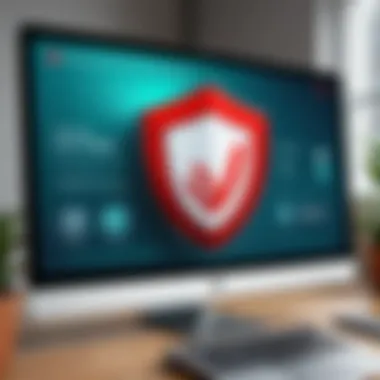Does ExpressVPN Really Protect You from Viruses?


Intro
In the digital landscape, online security is paramount. With increasing cyber threats, many individuals and organizations seek ways to enhance their protection. This leads to the inquiry of whether a virtual private network (VPN), like ExpressVPN, can shield users from viruses. Addressing this question necessitates a detailed examination of what VPNs do, their features, and their inherent limitations regarding virus protection.
ExpressVPN is known primarily for its privacy and data encryption capabilities. However, its role in virus protection is nuanced and requires careful analysis.
Overview of Software
Purpose and Use Cases
ExpressVPN serves two primary purposes: ensuring user anonymity and bypassing geographic restrictions. It conceals the user's IP address, making it difficult for websites and services to track their online activity. Furthermore, it allows users to access content that may be restricted in certain regions. While these functions are essential for online privacy, they do not inherently protect against malware or viruses.
Key Features
ExpressVPN boasts several features that enhance online safety, though they do not substitute for traditional virus protection. These include:
- Strong Encryption: ExpressVPN utilizes AES-256 encryption, ensuring that data transmitted over the internet is protected from eavesdroppers.
- Network Lock: This feature cuts off internet access if the VPN connection drops, preventing exposure of the user's true IP address.
- Split Tunneling: Users can choose which apps use the VPN, allowing for greater flexibility but not necessarily extra virus protection.
Despite these features, it is crucial to understand that ExpressVPN does not include built-in antivirus functionality.
In-Depth Review
Performance Analysis
Performance-wise, ExpressVPN is highly rated for speed and reliability. Users experience minimal lag when streaming or downloading content. However, regardless of how well a VPN performs, it cannot remove malware from a user's device. VPNs operate at a network level, not a device level, meaning that if malware resides on a device, the VPN cannot protect against it.
User Interface and Experience
ExpressVPN provides a user-friendly interface. Users can easily navigate through settings and connect to different servers worldwide. Its design simplifies the connection process, appealing to tech-savvy users and novices alike. However, ease of use does not change the fundamental fact that ExpressVPN does not replace the need for antivirus software.
"VPNs should be viewed as a tool for online privacy, not as a comprehensive virus protection solution."
Finale
Although ExpressVPN offers excellent tools for safeguarding online privacy, it does not directly protect against viruses or malware. Users must combine VPN use with reputable antivirus solutions to ensure complete online security. Practicing safe browsing habits and regularly updating software are equally vital components in protecting oneself against cyber threats. Understanding the limitations and functions of both VPNs and antivirus software can help users navigate the complexities of online safety.
Understanding VPN Technology
Understanding VPN Technology is fundamental to grasping how tools like ExpressVPN function to secure online experiences. A Virtual Private Network (VPN) primarily establishes a secure connection over the internet by encrypting data and masking the user's IP address. This functionality serves various purposes, notably enhancing privacy and security during online activities.
Functionality of a VPN
A VPN operates by creating a tunnel between the user’s device and the internet. When a user accesses a website while connected to a VPN, the request first goes to the VPN server rather than directly to the website. The VPN server then makes the request on behalf of the user, receiving the data and relaying it back through the secure tunnel. This process conceals the user’s real IP address, making online activities harder to trace. Furthermore, users can choose servers in various locations, allowing them to bypass geographical restrictions. This adaptability provides significant freedom in accessing content globally.
Encryption and Data Security
Encryption lies at the core of a VPN’s security model. VPNs use protocols like OpenVPN, IKEv2/IPsec, or WireGuard to encrypt data. This process transforms data into a form that cannot be read without the appropriate decryption key. The importance of encryption cannot be overstated; it protects sensitive information from being intercepted by hackers, especially on unsecured networks like public Wi-Fi. Thus, the role of encryption not only safeguards personal data but also maintains the integrity of communication hopping over the internet.
VPN vs. Firewall


It is critical to understand the distinction between a VPN and a firewall. A VPN focuses on user privacy and security by encrypting data and masking the user's location. In contrast, a firewall acts as a barrier between a trusted internal network and untrusted external sources. Firewalls monitor and control incoming and outgoing network traffic based on predetermined security rules. While both contribute to online security, they serve different functions. A VPN cannot replace the protection offered by a firewall, just as a firewall cannot perform the privacy-enhancing functions of a VPN.
In summary, understanding VPN technology is crucial for users looking to enhance their online safety and privacy.
By comprehending how a VPN operates, the significance of encryption, and the differences compared to firewalls, users can make informed decisions regarding their online security strategies.
Security Features of ExpressVPN
ExpressVPN provides a range of security features critical for enhancing online privacy and protection against potential threats. These features not only establish a secure connection but also ensure that users can navigate the internet with confidence. Understanding these aspects is essential, especially for those seeking robust security measures.
Advanced Encryption Standards
Advanced Encryption Standards (AES) are paramount when it comes to securing data transmitted over the internet. ExpressVPN uses AES-256-GCM, which is the gold standard in encryption technology. This level of encryption employs a 256-bit key size, making it nearly impossible for hackers to decrypt data without access to the key. In practical terms, this means that your online activities, such as browsing, streaming, or conducting any sensitive transactions, are safeguarded from potential interception. As digital threats continue to evolve, robust encryption serves as the first line of defense, protecting users from unauthorized access to their data.
Kill Switch Functionality
Another significant feature of ExpressVPN is its Kill Switch functionality. This tool acts as a safety net to prevent data leaks in the event of an unexpected disconnection from the VPN server. If your VPN connection drops for any reason, the Kill Switch will automatically stop all internet traffic. This ensures that sensitive information remains protected during such interruptions. While convenient, it is crucial to understand that the effectiveness of the Kill Switch can vary depending on network stability. For users regularly engaging in high-risk activities, maintaining an active Kill Switch provides an added layer of security.
DNS Leak Protection
DNS Leak Protection is essential in ensuring that a user's browsing activity remains private. Without this feature, DNS queries, which resolve website names into IP addresses, could bypass the VPN and expose the user's real IP address to the internet service provider or other third parties. ExpressVPN addresses this concern by routing all DNS queries through its secure servers, thus preventing any chance of leakage. As a result, users can browse with peace of mind, knowing that their online footprint is hidden from potential trackers.
Split Tunneling Options
Split tunneling is a feature that allows users to choose which applications use the VPN connection and which can connect directly to the internet. This is beneficial for users who want to access local services while simultaneously maintaining a secure connection for others. For instance, if you need access to your local bank while streaming content from a different region, split tunneling provides the flexibility to do both. However, users should be cautious using this feature; ensuring that sensitive apps use the VPN is vital to maintaining security integrity. Overall, split tunneling enhances user experience by balancing convenience and safety.
Does ExpressVPN Fight Viruses?
The question of whether ExpressVPN protects against viruses is nuanced. While ExpressVPN provides substantial security benefits, it is crucial to understand the limitations of what a VPN can achieve in the realm of malware protection. ExpressVPN encrypts a user's internet connection and masks their IP address, contributing to enhanced privacy and security online. Yet, it does not directly target or eliminate viruses or other malicious software.
VPNs and Malware Protection
VPNs like ExpressVPN can play a supportive role in protecting against malware, but they should not be viewed as a standalone solution. The encryption offered by a VPN secures data in transit, making it more difficult for hackers to intercept sensitive information. Moreover, using ExpressVPN may help in avoiding certain malware threats by blocking access to known malicious sites. This is due to its underlying infrastructure that limits connectivity to harmful locations on the web, thereby reducing exposure to potential threats.
However, the reality is that while a VPN can help in avoiding certain attacks, it does not actively scan files for viruses or remove them once they are on a device. For instance, if a user downloads a malicious file, a VPN will not prevent that file from compromising their device. Thus, VPNs fundamentally do not provide active malware scanning or removal actions.
Common Misconceptions
There are widespread misconceptions about the protective capabilities of a VPN in relation to viruses. One of the most common myths is that a VPN acts as a full antivirus solution. Some users believe that by simply using ExpressVPN, they are shielded from all forms of malware which is incorrect. It is essential to clarify that a VPN protects against unauthorized access to data and can help in encrypting traffic, but it does not have the capability to detect or eliminate existing viruses already present on a device.
Another misconception is that simply connecting to a VPN guarantees safety from all potential internet threats. This idea overlooks the fact that faith relies on various factors, including the user's online behavior and the security measures in place on their device. For effective protection against viruses, additional security tools such as antivirus software must be employed alongside VPN services.
"A VPN is only one component of comprehensive digital security; it cannot replace antivirus or other protective measures."
By dispelling these myths, users can better understand the essential roles that both VPNs and antivirus software play in their online security strategies. Education on this topic is critical for adopting effective practices that complement each technology’s strengths.
Limitations of VPNs
Understanding the limitations of VPNs is essential for grasping the full context of their role in digital security. While VPNs like ExpressVPN offer strong encryption and privacy features, they are not a foolproof solution against all online threats. Recognizing these limitations allows users to better assess their overall security posture and combine various tools to achieve better safety.
Inherent Risks of Online Activities


Even with the increased privacy that a VPN provides, certain inherent risks remain present in online activities. Users often engage with third-party websites and applications which can serve as potential attack vectors. These activities might include clicking on links in emails, downloading files from unknown sources, or engaging in peer-to-peer file sharing.
- Clicking Unknown Links: A user might be tricked into clicking a malicious link, leading to phishing attacks or malware installation.
- Public Wi-Fi Vulnerabilities: Using a VPN on public Wi-Fi may not completely eliminate risks, as there can still be other threats on the network.
- Browser Vulnerabilities: Supported browsers may have coding flaws that can be exploited even while connected to a VPN.
As such, despite the protections of a service like ExpressVPN, users must remain vigilant and apply caution in their activities to minimize these risks.
VPNs Cannot Replace Antivirus Software
It's a common myth that VPNs can replace dedicated antivirus software. This belief could lead to a false sense of security. While ExpressVPN may secure your connection and hide your online activities, it does nothing to scan your files or detect malware on your device.
Antivirus solutions are specifically designed to:
- Detect Malware: They routinely check for harmful programs on your device.
- Quarantine and Remove Threats: If a threat is detected, antivirus software works to isolate and eliminate it.
- Provide Real-Time Protection: Many antivirus applications offer real-time scanning capabilities to catch threats as they appear.
Using a VPN alongside antivirus software can enhance security. However, the two services address different aspects of security. VPNs focus on privacy and data protection, while antivirus software is essential for identifying and neutralizing threats.
"VPNs serve as an additional layer of privacy, but they are not a substitute for antivirus software. Both tools are necessary for a comprehensive security strategy."
Complementary Security Tools
Understanding the importance of complementary security tools is vital in the context of online protection. While tools like ExpressVPN enhance your privacy and security on the internet, they do not work in isolation. Instead, VPNs should be viewed as part of a broader security strategy that includes antivirus software and other protective measures. This section will dive deeper into the specific elements and benefits of antivirus and how it integrates with VPN services, focusing on key considerations for users.
Overview of Antivirus Software
Antivirus software serves a fundamental role in defending systems against various threats, such as viruses, malware, spyware, and ransomware. These programs are designed to detect and eliminate malicious software before it can harm your device or compromise your data. Popular antivirus options include Norton, McAfee, and Bitdefender. Each of these options has unique features and capabilities. Key functions of antivirus software include:
- Real-time Scanning: This feature continuously monitors files and processes on your system for signs of malicious activity.
- Automatic Updates: Keeping virus definitions current is crucial. Most antivirus software automatically updates to adapt to new threats.
- Scheduled Scans: Users can set specific times for comprehensive scans of their entire system, increasing the chances of early threat detection.
- Quarantine and Removal: Detected threats can be isolated and removed effectively. This prevents them from causing other damage.
While antivirus software is effective, it is not infallible. No system is impervious to new and sophisticated attacks. Thus, it is essential to couple antivirus software with additional layers of security, such as a VPN.
Integration of VPN and Antivirus
Integrating a VPN with antivirus software creates a synergistic effect in enhancing online security. By using both tools together, individuals strengthen their defenses in multiple ways. The VPN encrypts internet traffic, while the antivirus monitors files for malware. Here are a few benefits of this integration:
- Layered Defense: Utilizing both technologies ensures that when one layer falters, the other may still provide protection.
- Privacy and Security: A VPN masks your IP address, while antivirus prevents malware from accessing your personal information. This dual protection is essential for sensitive data.
- Risk Mitigation: The use of a VPN can reduce risk from untrusted networks. Even if the network is compromised, the VPN maintains a secure connection.
However, users must consider potential drawbacks. Having both services running simultaneously may affect system performance. Users should monitor their system’s resource usage and adjust settings accordingly. Additionally, a user must ensure that both services are compatible.
"A multi-layered approach to security is always more effective in mitigating risks associated with internet use."
Best Practices for Online Safety
The digital landscape poses various threats to online safety, including malware and phishing attacks. To combat these threats, it is crucial to establish a robust strategy for online security. This section delves into the essential practices that can safeguard users while integrating the use of a Virtual Private Network (VPN) like ExpressVPN with other security measures. Adhering to these practices can enhance overall security posture and mitigate risks.
Using a VPN Securely
Using ExpressVPN appropriately can significantly increase your online safety. First, ensure you connect to a secure server before accessing sensitive sites. A VPN not only encrypts your internet traffic but also masks your IP address, making your online activities more private. However, be aware that using a VPN alone does not protect against all cyber threats.
- Choose the right server: Select a server that meets your needs. Some servers may have different levels of capacity and speed.
- Avoid free VPNs: Free versions often compromise user privacy and may not offer adequate protection.
- Combine with antivirus software: Running antivirus alongside your VPN offers an added layer of defense against malware and other online threats.
Be mindful of your VPN provider’s privacy policy and service terms, as these could influence your data protection.


Updating Software Regularly
Regular updates for your VPN, operating system, and applications are vital. Updates often include security patches that fix vulnerabilities. Ignoring these updates may leave your device exposed to exploitation. Set your system to update automatically, if possible, to ensure you always run the latest version. Moreover, it is wise to review related settings post-update, as configuration options might change.
"Staying current with software updates can significantly reduce the risk of being compromised by known vulnerabilities."
Employing Strong Passwords
Strong passwords are foundational to any good security practice. A password should be complex, combining letters, numbers, and symbols. It is also vital that each account has a unique password. Using a password manager can simplify this task by generating and storing passwords securely.
Here are some tips for creating strong passwords:
- Length: Aim for at least 12-16 characters.
- Uniqueness: Avoid using common words or easily guessable information.
- Two-factor authentication: Where possible, enable two-factor authentication to add an additional layer of security.
By integrating these best practices into your online habits, you significantly enhance your security while using ExpressVPN or any other VPN service. The goal is not just to rely solely on a VPN, but to create a comprehensive security strategy that takes into account various possible vulnerabilities.
User Experiences and Feedback
The role of user experiences and feedback is significant in evaluating the effectiveness of ExpressVPN, especially regarding virus protection. It provides real-world insights that can validate or challenge the claims made by the VPN provider. When users share their experiences, they contribute to a collective understanding, which can inform potential buyers and help existing users optimize their security measures. Positive feedback often highlights advantages, such as ease of use, reliability, and perceived safety, while negative experiences can uncover limitations or issues that need addressing.
User feedback also emphasizes the importance of community perspectives. It encourages transparency in assessing security efficacy, as many users discuss their struggles with malware and how effectively the VPN has responded to these threats.
Case Studies on ExpressVPN Usage
Case studies provide detailed examples of how individual users or organizations have implemented ExpressVPN in their daily operations. For example, individuals working remotely during the pandemic have often shared their experiences maintaining secure connections to sensitive company data through ExpressVPN. Many found that while the VPN obscured their IP addresses from prying eyes, it still required additional layers of protection.
Furthermore, small businesses have reported on the VPN's role in protecting against data breaches. They shared instances where ExpressVPN successfully safeguarded communication channels, but they still emphasized the necessity of using antivirus software alongside the VPN. Common factors highlighted in these case studies include:
- Improved Sense of Security: Users often state they feel safer online knowing their connection is encrypted.
- Mixed Results Against Malware: Some users experienced malware attacks despite using ExpressVPN, reinforcing that additional protection tools are essential.
- Reliability: Many users praise the connection reliability for uninterrupted access to services.
Community Perspectives on Security Efficacy
Community discussions, particularly on forums like Reddit, feature an active exchange of user experiences with ExpressVPN. Participants regularly pose questions and share tips on safeguarding their devices against viruses. Common themes in these discussions include:
- Effectiveness Against Geo-Restrictions: Users appreciate the ability of ExpressVPN to bypass geo-restrictions, contributing to overall satisfaction.
- Limitations Noted: Many users caution against assuming that a VPN alone can protect all aspects of online security, particularly against viruses. They advocate for combined solutions.
- Peer Recommendations: Discussions often lead to recommendations for other security tools that can complement the use of a VPN.
In summary, the insights from user experiences and community feedback enrich the conversation around ExpressVPN's effectiveness. They add depth to understanding not merely how well the VPN performs but also how it fits into the broader context of online security. This perspective ensures that users have a comprehensive understanding as they navigate their online safety strategies.
Closure
In summary, the examination of ExpressVPN’s ability to protect users from viruses illustrates a complex interplay between virtual private network functionalities and malware defense. VPNs like ExpressVPN mainly offer enhanced online privacy and security through encryption and obfuscation of user data. Yet, it is crucial to understand that while ExpressVPN strengthens the overall security posture by shielding your internet traffic from potential snoopers, it does not inherently combat viruses or malware. This distinction is often misunderstood, leading to misconceptions about VPN capabilities.
Summary of Findings
Several critical points emerged from this article that summarize the findings:
- Function of VPNs: VPNs serve to encrypt data and mask users' IP addresses, providing a layer of anonymity.
- ExpressVPN Features: Certain security features, such as a kill switch and DNS leak protection, bolster the security of user connections. However, these features mainly protect the data stream, not the device itself from malware.
- Role of Antivirus Software: The necessity of antivirus software for comprehensive protection cannot be overstated. A VPN can improve privacy, but it cannot substitute for the protective functions of antivirus solutions.
The blend of VPN technology, combined with a robust antivirus program, can offer users a stronger defense against digital threats. Thus, users must employ both tools for optimal online security.
Final Thoughts on VPN Efficacy
The efficacy of VPNs in the realm of cyber protection hinges on a fundamental understanding of their purpose. ExpressVPN, while effective in certain areas, should not be seen as a catch-all solution against viruses. Instead, it complements existing security measures. The positive security outcomes experienced when using a VPN emphasize the importance of layered security. This involves leveraging the strengths of each protection medium, be it a VPN or antivirus software.
Ultimately, educated users who recognize the limitations and capabilities of their tools are in the best position to protect themselves online.
"Users must remember that no single solution can guarantee complete security. Combining VPN services with antivirus is the wisest approach to mitigating risks."







